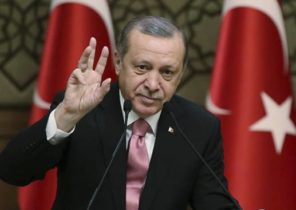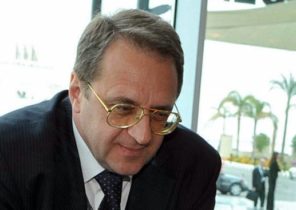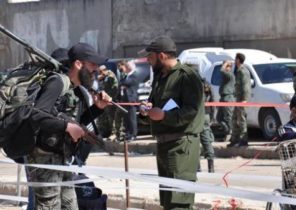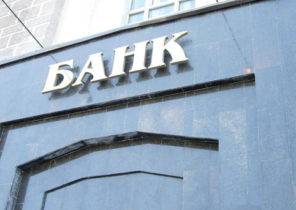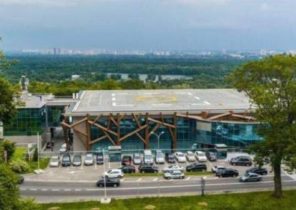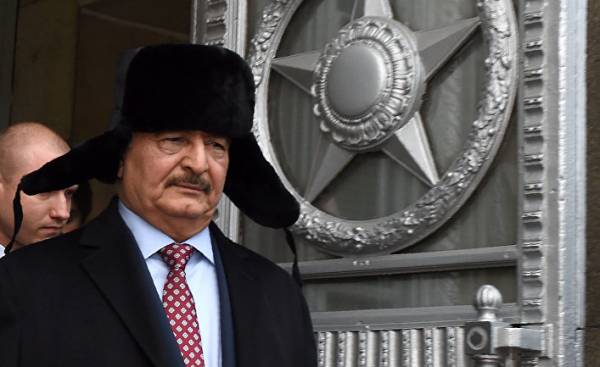
Russia, trying to find a foothold in Libya, wants to use the conflict as a springboard to extend its influence in North Africa. The second goal is to send a message to their opponents among the major powers, especially the United States and Europe, that it intends to restore its position at the global level, which was lost after the fall of the Berlin wall. The visit of Marshal Khalifa the Haftarot to Moscow demonstrated that Russia restores diplomatic weight in Libya and Vladimir Putin can solve the problems of war and peace, to direct the course of the conflict to their advantage, thus confirming the ambitions of his country in the field of global leadership.
On Monday, a meeting of Minister of foreign Affairs of Russia Sergey Lavrov and Marshal Khalifa the Haftarot, the commander of the armed forces, supported by the House of representatives in Tobruk (in the East), where the parties discussed the events unfolding around the Libyan crisis.
“We know that you cooperate with Sarraj and are making efforts to achieve a compromise. We support your efforts aimed at the conclusion of these agreements,” Lavrov said Haftarot during the meeting.
The Russian Minister confirmed that his country’s support for efforts “to intensify the political process to find a solution and restore the full sovereignty of the Libyan state”.
For its part, the Haftarah stressed that he is confident that Russia will remain a good friend of the Libyans and did not stop to assist them. About Moscow’s desire to play an important role in the Libyan negotiations, he said: “We will be very glad if Russia will take part in finding a solution to the Libyan crisis”.
Russia’s interest in Libya suggests that Tripoli becomes the object of Russian ambition and a tool for expanding its influence in the middle East and North Africa.
Judging by the actions of the Kremlin at the present time, we can say that the President of Russia Vladimir Putin has still not identified the real problem of their country in the Libyan context.
Mention should be made of the appointment of the special envoy of the UN Secretary General in Libya, Hassan Salaam, which started on the first week of August after visiting them in Paris meeting recognized Prime Minister of Libya Faiza Sarada with his opponent Marshal Khalifa the Haftarot.
Russia supports the Haftarot
Russia seeks to support the Haftarah, which is opposed to the Prime Minister Faiz Saraju, which in turn helps the West. In the view of many in Moscow, the Haftarot — a powerful figure in Eastern Libya. The fact that he is fighting with the Islamists, makes it an important partner in the fight against terrorism. In addition, support of the Marshal of the Haftarot contributes to the strengthening of Russia’s relations with Egypt, the main sponsor of the resolution in Libya.
Providing limited support for the Haftarot, Russia not only softens the Libyan conflict, but also informs the North Atlantic Alliance, NATO, how unreasonable was the Western intervention in Libya in 2011. Russia intends to prove that the change of regime in Libya and Ukraine, could lead only to chaos in the country.
On the other hand, Putin wants inside the country and abroad, he was regarded as a player using not only military force, but diplomatic means. After the demonstration of military force in Syria, Putin intends to play the role of peacemaker in Libya. In this connection, you need to consider the approach of the presidential elections to be held in March 2018. In addition, reaching a diplomatic success under the auspices of Russia, Putin will demonstrate that he was able to reverse the situation, which failed to make the Western countries.
War was the first option chosen by Moscow. In the spring of 2016, Russia has provided the Haftarah, which controls the Eastern part of the country, financial assistance. In particular, the Kremlin gave the Marshal Libyan dinars printed in Russia.
Relations with Haftarot peaked in June of that year, when he or his special envoy Abdel Basset al-Badri (the Libyan Ambassador in Saudi Arabia) visited Moscow with visits. In January of this year, the Libyan field Marshal was on Board the aircraft carrier “Kuznetsov”, where he held a videoconference with Russian defense Minister Sergei Shoigu.
Haftar Russia makes three demands, namely: political support in order to strengthen its image as the legitimate leader of Libya, assisting in the lifting of the embargo on arms imposed by the UN, as well as the delivery of shipments.
These meetings reinforced the conviction of the Haftarot that it will receive from Russia the same support as President Bashar al-Assad in Syria, currently, however, Russia’s actions in Libya are very careful. However, a French expert on security issues Arnaud Deslandes reported that Russia supplies to Libya of certain types of weapons, selling his first to Egypt in a legal way, then it is in the hands of the Haftarah, and this method is used most often. This procedure corresponds to the Russian interests, not only because it does not go beyond established under UN embargo on arms supplies, but also because Moscow considers Egypt as a strategic ally.
There have also been reports about the presence on the territory of Libya or the Libyan-Egyptian border military contingent, however, still say that these forces do not participate in combat operations and deployed to protect Russian technical specialists, who help to support the weapons of the Libyan army under the leadership of the Haftarot. At the same time, Moscow is exploring the possibility of a peaceful settlement, developing a network of contacts, which would include also the opponents of Haftarot. Moscow takes all of the UN resolutions on Libya and expresses its commitment to the political settlement of the crisis in Libya.
This does not mean that Moscow intends to support the government, backed by Western countries. During the visit of Faiz Saraga to Moscow, he was greeted less important to Russian officials than those that greeted the Haftarot. The same applies to the delegation from the city of Misurata, which was radical elements hostile to the Haftarot. At the same time, Russia maintains contacts with the government of national salvation, which is the third of the participants in the struggle for control of Libya.
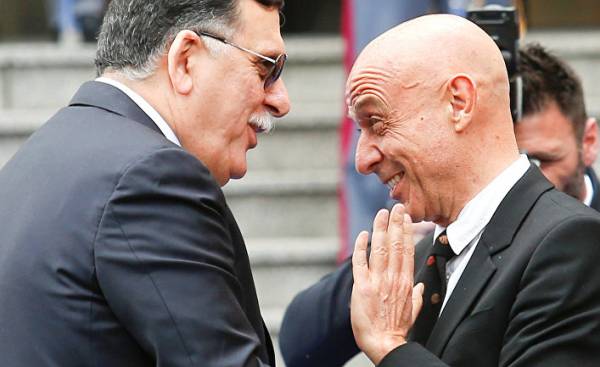 © REUTERS, Remo CasilliМинистр of foreign Affairs of Italy welcomed Marco Minniti, the Prime Minister of Libya Faiza Saraga in Rome. 20 Mar 2017
© REUTERS, Remo CasilliМинистр of foreign Affairs of Italy welcomed Marco Minniti, the Prime Minister of Libya Faiza Saraga in Rome. 20 Mar 2017
It is unlikely that Putin wants to drag Russia into a new conflict or to cause tension in relations with Egypt, dealing directly with the Haftarot in the supply of weapons.
However, can really change the quality of Russian support for the Haftarot by providing it with more modern weapons, or more technical assistance. It would compel the Marshal to proceed with military action, despite the fact that the probability of achieving a military victory will remain small.
Another hypothesis is that Russia can begin to work more closely with the Libyan military commander on issues related to terrorism, and use it to establish partnerships with U.S. President Donald trump, who has made the war on terrorism one of the main policy priorities of his administration. This option is considered by the Minister of defence of Russia, however, needs to get “green signal” from the Kremlin.
Care Europe
Most likely, Putin will continue his policy is uncertain, which is reflected in the minimal provision of military support to the Haftarot through the supply of weapons and the involvement of Russian diplomacy, the evidence of which was the invitation of one of the Libyan leaders to Moscow. In addition, in the case of Libya, Russia warned the world about the consequences of regime change.
Today’s Arab News #Cartoon by @mohammedrayies1 #Syria #Russia #Libya pic.twitter.com/aeS7vxIfs8
— Arab News (@Arab_News) on 7 February 2017.
European countries such as Italy and Britain, wanted to avoid escalation of the conflict with Moscow, and diplomatic ambitions of Russia contribute to progress in this direction. In particular, Russian decision-makers expect their country will be invited to take part in international discussions on Libya, as it happens around other regional topics, including around the peace process in the middle East.
Meanwhile, the UN and Hassan Salaam has no choice but to cooperate with Russia and to support the idea of negotiations between the EU and Moscow on Libya. In particular, Russia must enter the new contact group on the condition that she would work to reduce tensions in Libya and cease to support the Haftarot.
On the background of the crisis in the Persian Gulf, Abu Dhabi is considering Libya as an arena for the next battle against political Islam and could take the decision to support the Haftarot. This means that the civil war in Libya will drag on for years. Egypt will probably take a more cautious stance, focusing on securing its Western border. As for Europe, it remains to be careful that in this case, take the Russian side, and to cease cooperation if the presence of Moscow in Libya will contribute to the growth of tension.

